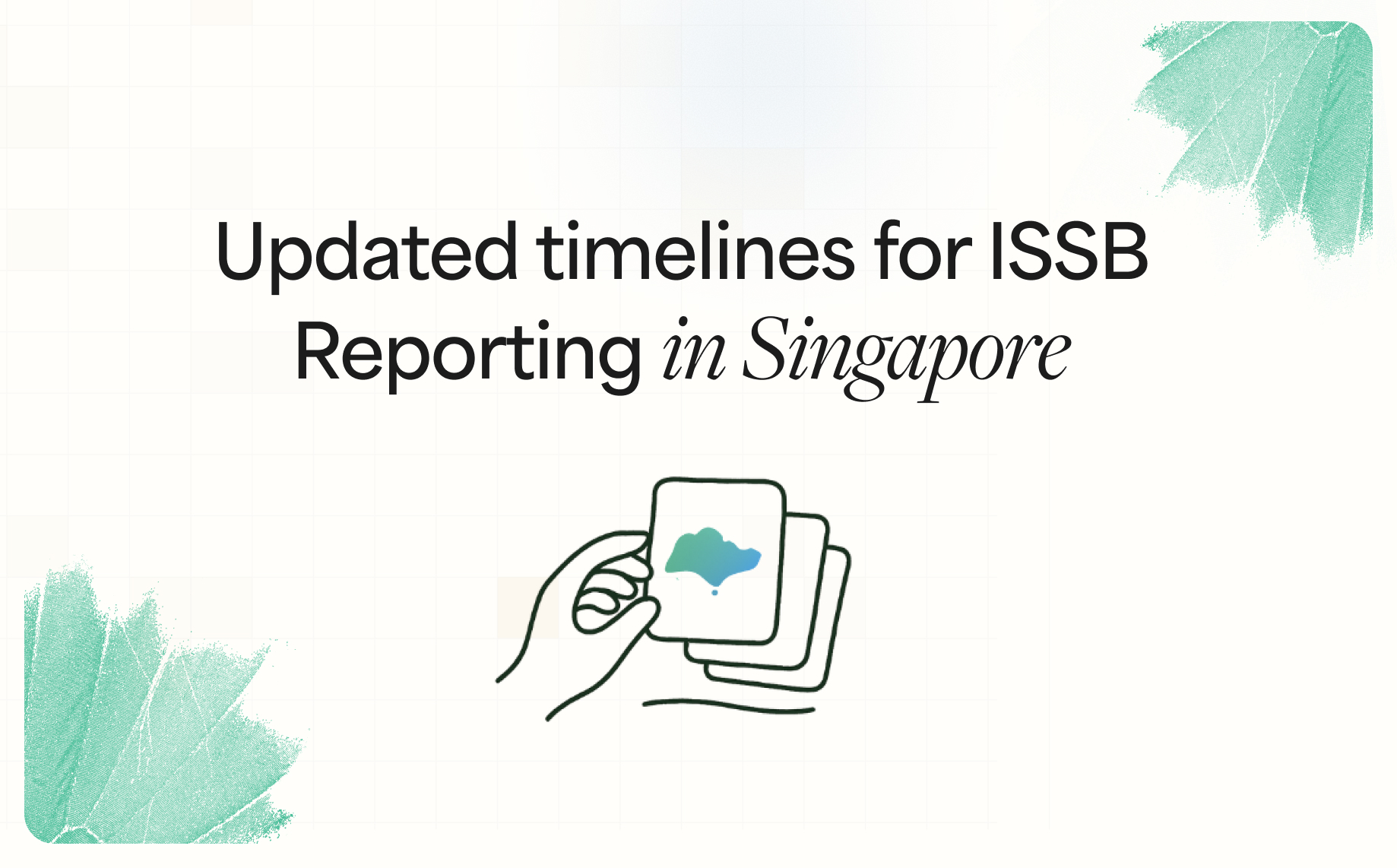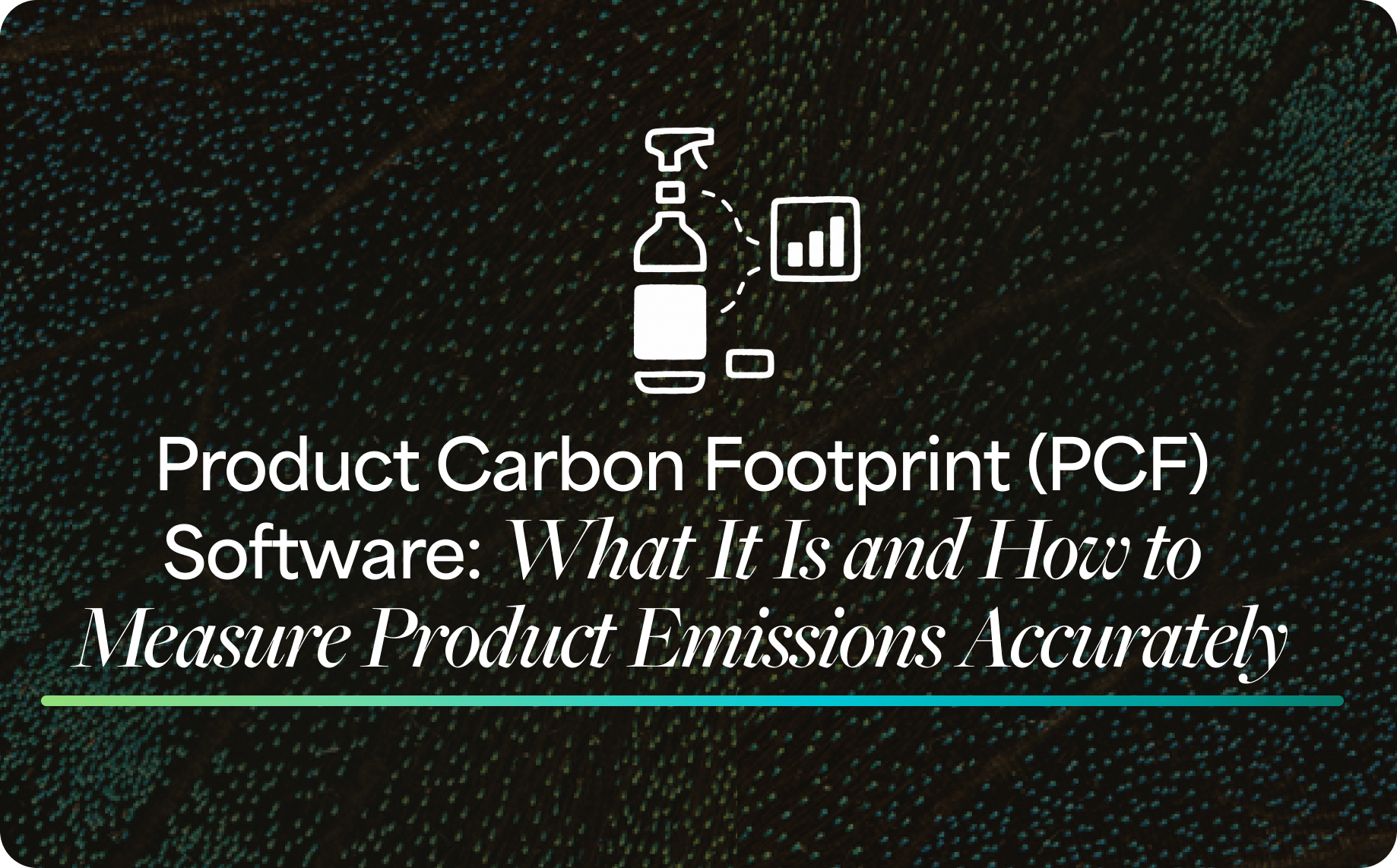Companies in Singapore are preparing for a shift in sustainability and ESG performance reporting as regulatory bodies move to adopt the International Sustainability Standards Board (ISSB) framework. Beginning in FY2025, the Accounting and Corporate Regulatory Authority (ACRA) and SGX RegCo will require climate-related disclosures from listed companies. This starts with reporting on Scope 1 and Scope 2 greenhouse gas (GHG) emissions and sets the foundation for broader sustainability practices across Singapore’s corporate landscape. In the most recent update, timelines for implementing climate reporting have been extended to further support companies during this transition.
Investor demand for consistent, decision-useful climate data is a key driver of this change. The new rules aim to give investors clear, comparable information, while encouraging companies to bake climate risks and opportunities into business decisions. Singapore’s equity market currently hosts about 613 listed companies, underscoring the scale of the transition.
What is ISSB Reporting and Why is it Important for Singapore?
Overview of ISSB and Its Role
ISSB standards (IFRS S1 and S2) set a global baseline for sustainability disclosures. IFRS S1 covers the general requirements for sustainability-related financial information; IFRS S2 focuses specifically on climate. Together, they help you present clear, comparable information that investors can use. Adopting these standards can sharpen risk management, improve access to capital, and strengthen your market reputation.
Singapore is aligning with these standards through a phased roadmap so that disclosures filed domestically are consistent with global practice and useful to investors.
Key Regulatory Milestones for ISSB Reporting in Singapore
Timeline Breakdown for Mandatory Disclosures (updated with extended timelines)
Singapore has set a clear timetable for climate-related disclosures aligned to ISSB:
- FY2025:
- SGX-listed companies begin reporting Scope 1 and Scope 2 GHG emissions
- STI (Straits Times Index Constituents) begin reporting other IFRS S2-aligned climate related disclosures
- FY2026: STI (Straits Times Index) Constituents begin reporting Scope 3 GHG emissions. Scope 3 disclosures for non-STI constituent listed companies remain voluntary until further review.
- FY2028 (previously FY2025): Non-STI constituent listed companies with more than $1B market cap begin reporting other IFRS S2-aligned climate related disclosures
- FY2029 (previously FY2027): SGX-listed companies obtain limited external assurance on Scope 1 and Scope 2 (covering FY2026 data).
- FY2030 (previously FY2025): Non-STI constituent listed companies with less than $1B market cap begin reporting other IFRS S2-aligned climate related disclosures
Reporting Requirements for Non-listed Companies
“Large non-listed companies” are defined as those with revenue ≥ S$1 billion and total assets ≥ S$500 million (thresholds assessed using the two preceding financial years). Their requirements are phased in later (updated with extended timelines):
- FY2030 (previously FY2027): Large non-listed companies begin reporting climate-related disclosures, including Scope 1 and Scope 2.
- FY2032 (previously FY2029): Limited assurance on Scope 1 and Scope 2, with Scope 3 emissions reporting remaining voluntary until further review
Singapore will review experience before extending requirements to other non-listed companies; there is no fixed date yet for smaller firms.
Useful example: If a Singapore entity is included in a publicly available consolidated sustainability/climate report prepared by its parent under Singapore’s prescribed requirements or a regime deemed equivalent (e.g., ESRS), it may be exempt from filing locally. A transitional 3-year exemption (FY2027–FY2029) is also available if reporting under TCFD/GRI; this is intended to smooth the shift to ISSB-aligned reporting.
Who Must Comply with ISSB Standards in Singapore?
Detailed Structures of Compliance Requirements
- STI constituents: Climate reporting including Scope 1 and 2 begins FY2025, with Scope 3 in FY2026 and limited assurance on Scope 1 and 2 from FY2029.
- Non-STI constituent listed companies with more than $1B market cap: Begin Scope 1 and 2 reporting from FY2025, adding other ISSB-based climate related disclosures from FY2028, and limited assurance on Scope 1 and 2 from FY2029.
- Non-STI constituent listed companies with less than $1B market cap: Begin Scope 1 and 2 reporting from FY2025, adding other ISSB-based climate related disclosures from FY2030, and limited assurance on Scope 1 and 2 from FY2029.
- Large non-listed companies (revenue ≥ S$1b and assets ≥ S$500m): Climate reporting starts FY20230 (Scope 1 and 2), and limited assurance on Scope 1 and 2 from FY2032.
- Smaller enterprises: Timelines are still under review; authorities will assess capacity and international developments before expanding scope.
This progression raises the bar on accountability and pushes companies to build processes for data governance, controls, and integration with financial reporting.
How to Prepare for ISSB Reporting: Practical Steps
Actionable Checklist for Companies
1) Conduct a reporting readiness assessment
Map your current disclosures, data sources, and control environment to IFRS S1/S2, and identify gaps. Pay special attention to Scope 3 boundaries, methodologies, and category coverage. A 2024 ACRA-NUS study found 59% of examined issuers already disclosed Scope 3, with 41% breaking it down by category—good progress, but consistency and completeness still vary.
2) Strengthen emissions data and analytics governance
Document methodologies (e.g., operational vs. financial control), set controls over activity data and emission factors, and prepare for assurance. From FY2027 (listed) and FY2029 (large non-listed), limited assurance on Scope 1 and 2 will apply. Assurance may be performed by an ACRA-registered audit firm or a Singapore Accreditation Council-accredited testing, inspection and certification firm.
3) Prepare for digital, structured reporting
ISSB provides an IFRS Sustainability Disclosure Taxonomy to make disclosures machine-readable.
4) Build capacity
Tap local training and guidance. ISCA and market partners run regular workshops on IFRS S1/S2 reporting and assurance expectations; sector resources are also growing (for example, the Singapore Emission Factors Registry provides localised emission factors to improve measurement quality).
5) Plan your budget, and use available support
Actual costs vary by complexity, sector, and system needs. To defray expenses, Singapore’s Sustainability Reporting Grant (SRG) co-funds up to 30% of eligible costs for a company’s first ISSB-aligned climate report, capped at S$150,000 (covering consultancy, assurance, software/equipment, and staff training).
Essential Insights to Keep in Mind
- Scale: Around 613 companies are listed on SGX; all will be affected by the climate-reporting roadmap starting in FY2025, with timing staged by requirement.
- Progress: Many issuers already disclose climate data: the ACRA–NUS review reports 59% with Scope 3 disclosures, though depth and category coverage can improve.
- Support: The SRG co-funds up to 30% of qualifying costs for first-time ISSB-aligned climate reports (cap S$150,000).
Conclusion
Singapore is moving decisively to ISSB-aligned reporting. Your near-term plan should focus on building sound data foundations, aligning to IFRS S1/S2, and getting ready for assurance.
The extended timeline provides valuable space to build capacity, strengthen data systems, and embed sustainability into core strategies. By starting early, organisations can move beyond compliance to unlock long-term resilience and competitive advantage in a rapidly evolving business landscape.
With meticulous planning and strategic investments in emissions data systems, governance processes, and assurance practices, Singaporean companies can not only comply with these regulations but also capitalise on emerging opportunities in sustainability performance. For customised support, explore our ISSB disclosure and reporting resources.
Looking for efficient tools to help support your transition? Unravel Carbon’s AI agents for sustainability can help you identify your gaps, transform your data, calculate your emissions, and report your climate-related disclosures- integrating and elevating your current workflows. Reach out via hello@unravelcarbon.com to learn more.
Research Integration Notes (updated)
- The ACRA–SGX RegCo roadmap confirms phased adoption (listed from FY2025; Scope 3 from FY2026; assurance thereafter; large non-listed from FY2027 with Scope 3 no earlier than FY2029). SGX Links
59% of surveyed issuers disclosed Scope 3 in 2024; 41% disclosed by category. Default+1
The Sustainability Reporting Grant co-funds up to 30% of eligible first-report costs (cap S$150,000). Enterprise Singapore - Assurance providers can be ACRA-registered audit firms or SAC-accredited TIC firms. Economic Development Board
Links
- ACRA & SGX RegCo climate-reporting roadmap (media release)
- SGX ESGenome disclosure portal
- IFRS S1 and IFRS S2 (ISSB)
- ACRA–NUS climate reporting study (2024)
- Sustainability Reporting Grant (EDB/EnterpriseSG)
- Singapore Emission Factors Registry (SEFR)



.jpg)
.jpg)
